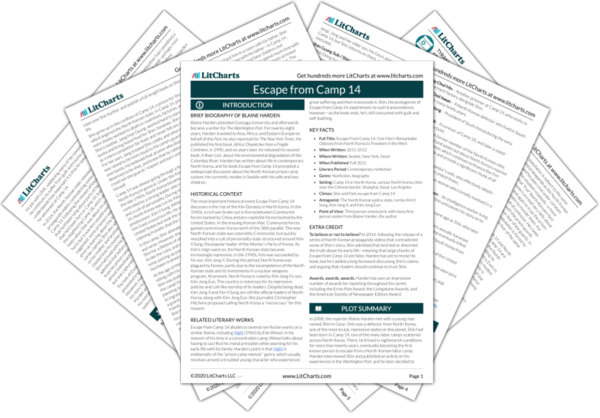Summary
Analysis
A few years after the events of the last chapter, Shin stands in front of a small audience in Los Angeles, speaking—as always—about Camp 14. As an employee of LiNK, Shin travels around the country speaking about his experiences. LiNK has encouraged Shin to speak in crisp, well-organized English, so that he can move as many people as possible. But Shin’s speeches are poorly organized, and he has to use a translator to communicate with his audiences. His descriptions of Camp 14 are brief and detail-free—some people even find them boring.
As a human rights activist, Shin had one primary job: speaking honestly and emotionally about what he endured in Camp 14. However, Shin found it extremely difficult to do so—not just because he couldn’t speak English well, but because he couldn’t be honest with himself about what he’d done in Camp 14 (above all, betraying his own family), and in fact couldn’t even say which prison camp he’d lived in. As a result, he shied away from delivering powerful speeches that could galvanize the public into action.
Themes
Harden has asked Shin why he finds it so hard to talk about his life. Shin explains that he still has nightmares about his mother’s death. When LiNK tries to convince him to go to therapy, he refuses. He also refuses to consider attending college. In general, his adjustment to life in America isn’t easy. Doctors diagnose him with post-traumatic stress disorder. He struggles to understand money. He bonds with his LiNK coworkers, and says that he “loves” them. In general, however, Shin suffers from intense shame and self-loathing.
Shin tried to adjust to his new life, but kept coming back to the same core problem: he couldn’t respect himself knowing that he’d betrayed his mother and brother to their deaths—and it’s entirely possible that he only survived the camps because he betrayed them. As a result, his friendships with his new coworkers could only go so far—he wasn’t willing to open up too much with anyone else.
Themes
Shin begins living with a pastor’s wife named Kyung Soon Chung, who cooks for him and essentially acts as his mother. He befriends Kyung’s children, both in their twenties. Shin learns to love Kyung, and accept her love. He often asks her, “Why are you so nice to me?” and confesses that he’s done horrible things during his time in Camp 14. Over time, however, he becomes more confident, and begins to embrace Christianity. He tries to study English, but quickly drops out of his program. His LiNK coworkers and supervisors say that he wasn’t ready to adjust to a new life in the U.S.
In the U.S., Shin found many people who treated him with love and compassion, including Kyung. And yet Shin found it difficult to accept that he was worthy of anybody else’s time and affection—he had such a low opinion of himself that he couldn’t understand why others would be kind to him.
Themes
California is one of the few places in America where a Korean can get by without speaking a word of English—there’s a huge Korean population there. Shin learns enough English to get by in Los Angeles, but little more—he spends most of his time speaking Korean.
Shin continued to hold himself at arm’s length from other people: he didn’t learn English, he didn’t have many close friendships with other people, and—quite understandably—he didn’t open up about his past.
Themes
Get the entire Escape from Camp 14 LitChart as a printable PDF.

During Shin’s second year in California, he meets Harim Lee, a young woman from Seoul who moved to Los Angeles with her family at the age of four. Harim worked as a translator for an NGO, and in the middle of college, she decided to join LiNK. She prayed that she’d get a chance to meet Shin. When they finally meet, they like each other right away. This creates a problem, though: LiNK refugees and interns aren’t allowed to date each other. Shin and Harim ignore the rule, but Shin eventually decides to quit LiNK anyway. He quits partly because of the no-dating rule and partly because he feels his supervisors are expecting too much of him—he doesn’t want to learn English. It’s unclear what Shin wants to do with the rest of his life, or if he has any idea at all.
Shin’s relationship with Harim exemplifies many of the issues that continue to haunt him. As a member of LiNK, Shin’s duty was to open up to other people about his time in prison camp. However, Shin clearly wasn’t ready to do so—first, he had to learn to respect himself. So it makes a certain amount of sense that Shin would leave LiNK to pursue a relationship with Harim: before becoming a successful human rights activist, he had to prove to himself that he could love someone else and accept that person’s love in return.
Themes












